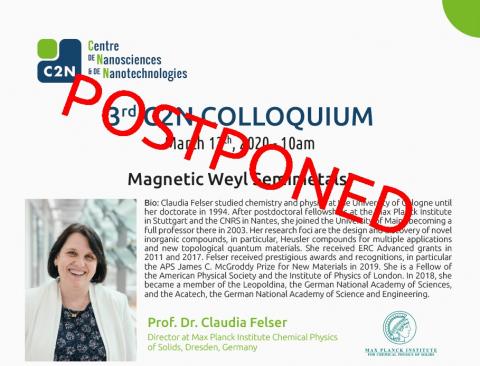
Troisième Colloquium du C2N : Claudia Felser
Le C2N a le plaisir d'organiser son troisième colloquium le 13 Mars prochain (à 10h), dans son Amphithéâtre au coeur du campus Paris-Saclay. Il accueillera pour cette occasion Claudia Felser, Professeure et actuelle Directrice de l'Institut Max-Planck de physico-chimie des matériaux solides, basé à Dresde. Ses recherches concernent surtout la science des matériaux en rapport avec la technologie informatique, ainsi que l'utilisation de l'énergie solaire. Elle est membre de l'Académie allemande des sciences Leopoldina depuis 2018, et colauréate 2019 du Prix James McGroddy pour les nouveaux matériaux décerné par l'American Physical Society (APS).
Sa présentation, qui s'adressera à une audience large, aura pour thème :
Magnetic Weyl Semimetals!
Abstract: Topology, a mathematical concept, recently became a hot and truly transdisciplinary topic in condensed matter physics, solid state chemistry and materials science. Since there is a direct connection between real space: atoms, valence electrons, bonds and orbitals, and reciprocal space: bands, Fermi surfaces and Berry curvature, a simple classification of topological materials in a single particle picture should be possible.
Binary phosphides are an ideal material class for a systematic study of Dirac, Weyl and new Fermion physics, since these compounds can be grown as high-quality single crystals. Beyond Weyl and Dirac, new fermions can be identified in compounds that have linear and quadratic 3-, 6- and 8- band crossings that are stabilized by space group symmetries. In magnetic materials the Berry curvature and the classical anomalous Hall (AHE) and spin Hall effect (SHE) helps to identify potentially interesting candidates. As a consequence, the magnetic Heusler compounds have already been identified as Weyl semimetals: for example, Co2YZ, and Co3Sn2S2.
The Anomalous Hall angle also helps to identify materials in which a Quantum anomalous Hall (QAHE) should be possible in thin films. Heusler compounds with non-collinear magnetic structures also possess real-space topological states in the form of magnetic antiskyrmions, which have not yet been observed in other materials.
Bio: Claudia Felser studied chemistry and physics at the University of Cologne until her doctorate in 1994. After postdoctoral fellowships at the Max Planck Institute in Stuttgart and the CNRS in Nantes, she joined the University of Mainz becoming a full professor there in 2003. Her research foci are the design and discovery of novel inorganic compounds, in particular, Heusler compounds for multiple applications and new topological quantum materials. She received ERC Advanced grants in 2011 and 2017. Felser received prestigious awards and recognitions, in particular the APS James C. McGroddy Prize for New Materials in 2019. She is a Fellow of the American Physical Society and the Institute of Physics of London. In 2018, she became a member of the Leopoldina, the German National Academy of Sciences, and the Acatech, the German National Academy of Science and Engineering.
Le séminaire sera suivi d'une discussion entre Claudia Felser et les doctorants/post-doctorants, puis d'un cocktail servi dans le hall d'entrée du C2N.
10 boulevard Thomas Gobert - PalaiseauLe C2N a le plaisir d'organiser son troisième colloquium le 13 Mars prochain (à 10h), dans son Amphithéâtre au coeur du campus Paris-Saclay. Il accueillera pour cette occasion Claudia Felser, Professeure et actuelle Directrice de l'Institut Max-Planck de physico-chimie des matériaux solides, basé à Dresde. Ses recherches concernent surtout la science des matériaux en rapport avec la technologie informatique, ainsi que l'utilisation de l'énergie solaire. Elle est membre de l'Académie allemande des sciences Leopoldina depuis 2018, et colauréate 2019 du Prix James McGroddy pour les nouveaux matériaux décerné par l'American Physical Society (APS).
Sa présentation, qui s'adressera à une audience large, aura pour thème :
Magnetic Weyl Semimetals!
Abstract: Topology, a mathematical concept, recently became a hot and truly transdisciplinary topic in condensed matter physics, solid state chemistry and materials science. Since there is a direct connection between real space: atoms, valence electrons, bonds and orbitals, and reciprocal space: bands, Fermi surfaces and Berry curvature, a simple classification of topological materials in a single particle picture should be possible.
Binary phosphides are an ideal material class for a systematic study of Dirac, Weyl and new Fermion physics, since these compounds can be grown as high-quality single crystals. Beyond Weyl and Dirac, new fermions can be identified in compounds that have linear and quadratic 3-, 6- and 8- band crossings that are stabilized by space group symmetries. In magnetic materials the Berry curvature and the classical anomalous Hall (AHE) and spin Hall effect (SHE) helps to identify potentially interesting candidates. As a consequence, the magnetic Heusler compounds have already been identified as Weyl semimetals: for example, Co2YZ, and Co3Sn2S2.
The Anomalous Hall angle also helps to identify materials in which a Quantum anomalous Hall (QAHE) should be possible in thin films. Heusler compounds with non-collinear magnetic structures also possess real-space topological states in the form of magnetic antiskyrmions, which have not yet been observed in other materials.
Bio: Claudia Felser studied chemistry and physics at the University of Cologne until her doctorate in 1994. After postdoctoral fellowships at the Max Planck Institute in Stuttgart and the CNRS in Nantes, she joined the University of Mainz becoming a full professor there in 2003. Her research foci are the design and discovery of novel inorganic compounds, in particular, Heusler compounds for multiple applications and new topological quantum materials. She received ERC Advanced grants in 2011 and 2017. Felser received prestigious awards and recognitions, in particular the APS James C. McGroddy Prize for New Materials in 2019. She is a Fellow of the American Physical Society and the Institute of Physics of London. In 2018, she became a member of the Leopoldina, the German National Academy of Sciences, and the Acatech, the German National Academy of Science and Engineering.
Le séminaire sera suivi d'une discussion entre Claudia Felser et les doctorants/post-doctorants, puis d'un cocktail servi dans le hall d'entrée du C2N.
